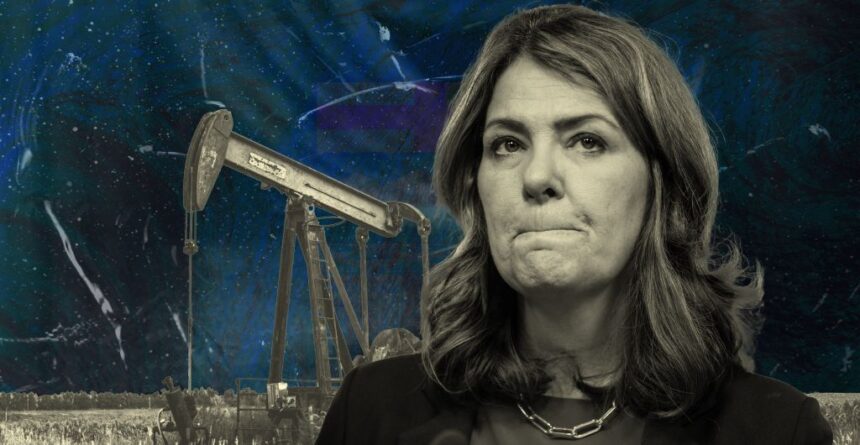START – Apple News Only Block Add content to the Apple News only block. You can add things like headings, paragraphs, images, galleries and audio clips. The content added here will not be visable on the website article Get the inside scoop on The Narwhal’s environment and climate reporting by signing up for our free newsletter. END – Apple News Only Block The day after the federal election that saw Mark Carney installed as prime minister, Alberta’s premier, Danielle Smith, introduced sweeping changes to democracy in Alberta. Among those changes was a relaxation of the rules around referendums, paving the way for a separation vote. All of it is driven by a perception that Alberta’s prosperity is under attack by a hostile force. According to the premier, that hostile force is not the U.S. and its tariffs or threats of annexation. It’s Ottawa. Underlying it all? “Alberta’s prosperity” is shorthand for the oil and gas industry. And the move to relax referendum rules is not a reaction to the current state of affairs — it’s the Smith government seizing a moment to institute a long-held and oil-rooted plan called the Free Alberta Strategy. Smith swept into power with her long-time political ally Rob Anderson at her side as her chief of staff, and tucked neatly under his arm was a strategy to pull Alberta from confederation — partially if possible, entirely if need be. “Alberta’s treatment within Canada has become intolerable,” Anderson and his co-authors wrote in the Free Alberta Strategy in 2021, adding the federal government had undertaken an “assault” on “Alberta’s largest and most critical industry,” meaning, of course, the oil and gas sector. Throughout her short reign, Smith and Anderson have followed that plan closely, and appear to be capitalizing on both an international crisis and an election that didn’t go their way to pave the way for more extreme aspects of the plan. Smith is not wrong that the oil and gas sector is of huge economic importance in Alberta — a one-dollar swing in the price of a barrel can mean $750 million more (or less) in the provincial budget. The sector is also not disappearing anytime soon. But while blaming the industry’s fortunes squarely on Ottawa, and pushing the narrative of a shared enemy might be good for amping up vitriol, the strategy does little to help her lead the province through an era of intense uncertainty. It’s an era that will have a profound effect on Alberta’s future and on the future of its oil and gas industry. Free Alberta Strategy is the backbone of Smith’s rhetoric, and centred on oil and gas woes The Free Alberta Strategy, written by Anderson, along with University of Calgary political science professor Barry Cooper and lawyer Derek From, calls for the province to institute several measures in response to what it calls “sustained federal attacks on Alberta” — attacks, it says, that are largely centred on the oil and gas industry, from the consumer carbon tax (which has since been eliminated) to federal environmental assessment legislation to a ban on oil tankers off the B.C. coast. The first order of business to fight back, according to the strategy, is to enact the Alberta Sovereignty Act, which Smith did as her first order of business. The next steps the strategy outlines include the creation of an Alberta police force, and pulling the province out of the Canada Pension Plan. The strategy also says Alberta should opt out of all federal programs that it sees as interfering with provincial jurisdiction, including education, resource development, environmental regulation, property rights and health. While attempts at creating a provincial pension plan have faltered, and the creation of a police force carries on piecemeal following clear public disinterest, the provincial government has leaned into the argument of economic carnage and the need to protect Alberta’s energy sector from Ottawa. Prime Minister Mark Carney faces two challenges to national unity, one from the United States and another, perhaps related, from the Alberta government of Danielle Smith. Photo: Kamara Morozuk / The Narwhal In the strategy, this would prohibit “attempts by federal agencies to regulate our province’s energy sector in any manner.” In practice, the Smith government has introduced amendments to its Critical Infrastructure Defence Act that would attempt to bar federal employees from facilities that track and compile emissions data — even private facilities that are not operated by the Alberta government. The province is also challenging draft federal clean electricity legislation in court and making demands of the Liberal government all tied to opening more oil and gas exploration, which Alberta wants to double. If those demands are not met, there could be a “national unity crisis,” Smith said prior to Carney’s election. In a list of demands the Alberta government presented to Prime Minister Carney on May 5, only one wasn’t directly linked to oil and gas — a call to completely overhaul equalization payments, in which funds are redistributed across the country from wealthier regions. In Alberta, those payouts are inseparably linked to the fortunes wrought from the oil and gas sector. Now, days after the federal vote, Smith is echoing the Free Alberta Strategy, saying Ottawa’s treatment of Alberta has “become unbearable” and separatists in the province are not a fringe minority, but loyal Albertans “who’ve just had enough of having their livelihoods and prosperity attacked by a hostile federal government.” That’s almost word for word from the Free Alberta Strategy written four years ago. Albertan anger at Ottawa is as old as confederation Directing anger at Ottawa isn’t new in Alberta, it’s a time-honoured tradition as old as the province itself, when it entered confederation without the same ownership of its resources as other provinces (a slight that was later rectified). Every government in the province has used the federal government as a foil to rally the troops and shore up political support. That’s usually a conservative government, but even the NDP stirred the federal pot during its four-year reign. Talk of separation isn’t new either. It ebbs and flows depending on who’s in power in Ottawa and the federal policies they’re enacting. Former Alberta Premier Jason Kenney convened a panel to seek a better deal in confederation for Canada, but was a staunch federalist and didn’t entertain separatist ideas. Photo: Alberta Government / Flickr Those outbursts usually burn brightly for a moment and then flame out, but there historically hasn’t been the same level of tacit support from the provincial government as there is today. Smith rose to power after Jason Kenney, a staunch federalist who was shown the door by the party he helped found. Despite the merger of two right-wing parties to form the United Conservatives, the movement was strained between factions, including separatists and sovereigntists on its outer flank. Smith owes her victory to some of those outer flanks. She is from those outer flanks, and so is her chief advisor, Anderson. It’s a flank that views the province’s oil and gas industry as under assault from “hostile and unreliable federal governments” — and one that’s willing to go to increasingly extreme measures to defend it. Smith government has been laser focused on promoting Alberta oil and gas, including in anti-Ottawa rhetoric Smith’s government has been focused almost entirely on expanding and promoting Alberta’s oil and gas sector in a way that exceeds past governments — a notable feat where the sector has long padded provincial budgets. The United Conservative Party under Smith has not only pushed back against federal policies, but worked to reshape Alberta’s electricity grid to all but block renewables and encourage more natural gas consumption. It’s also considering elimination of its industrial carbon levy. Where past separatist or western alienation movements have focused on political principles, including increased representation and senate reform alongside resource development, Smith’s focus is on making more money. The main driver behind the Free Alberta Strategy, and the main rhetorical assault from the premier, isn’t about identity or about politics, it is centred on climate policies and the energy sector.
Danielle Smith says separation is about alienation. Its really about oil











